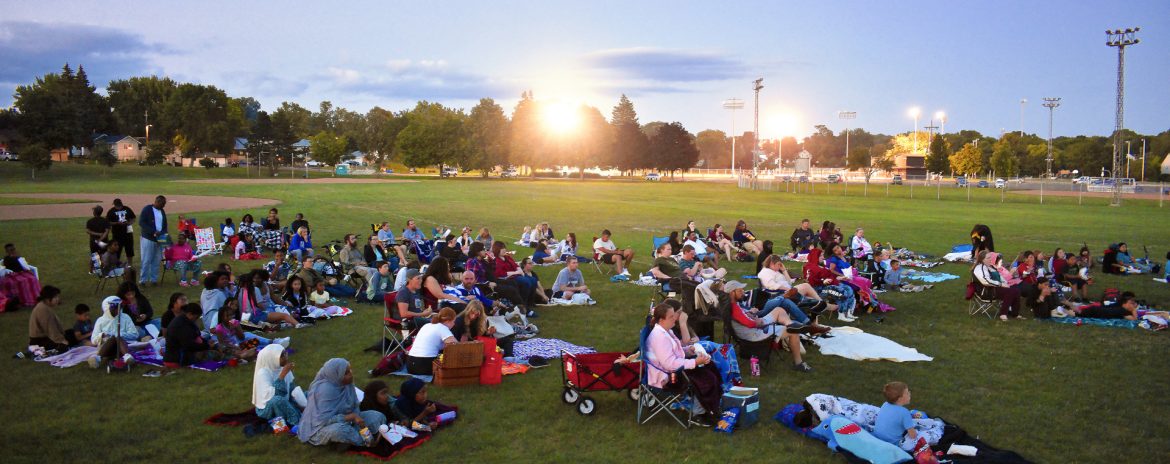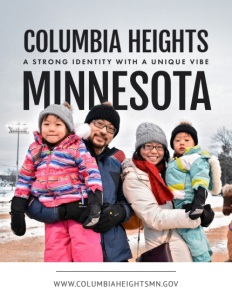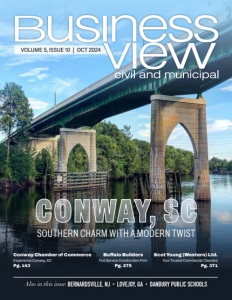Columbia Heights, Minnesota
A Strong Identity with a Unique Vibe
Creativity and Vision Shape Urban Renaissance
Columbia Heights, a dynamic first-ring suburb on the northeast of Minneapolis, is far from your typical small town. Known for its vibrant food scene, diverse population, and strong sense of community, the city of just over 21,000 residents features a distinctive charm and character. However, beneath its quaint streets and bustling local businesses lies a city undergoing significant transformation. With ambitious redevelopment projects, innovative problem-solving, and commitment to affordability, Columbia Heights is steadily shaping its future, positioning itself as a model for sustainable urban growth.
Aaron Chirpich, City Manager, and Mitchell Forney, Community Development Director, focus on transforming Columbia Heights. They are addressing the challenges of an aging community while working to ensure the city remains vibrant and welcoming—a place where residents want to live, work, and thrive.
“We’re known for having an excellent food scene,” Chirpich says. “We’re not getting the traditional sit down American national chain restaurants but are getting an amazing selection of local ethnic restaurants that reflect our diverse community.”
“A lot of excellent restaurants, a wide variety of one-off places, not the chain restaurants, and there’s a renaissance happening for us right now.”
As Chirpich and Forney explain, Columbia Heights offers the best of both worlds: small-town connectivity with the amenities of a larger urban center. It’s a city where neighbors know each other, businesses flourish on community support, and development projects push the boundaries of what’s possible for a suburb of its size.
Small-town feel and urban character
Forney describes Columbia Heights as an “urban bedroom community,” where many residents live and socialize locally but commute to nearby areas for work. While Columbia Heights is a suburb, its unique blend of close-knit community and urban vibrancy sets it apart from other regional cities.
“People are engaged here,” Forney says. “It’s not a traditional city where you don’t know the people living next to you. Here, everyone’s involved in something—local initiatives, politics, or neighborhood events like National Night Out.”
National Night Out is a popular annual event in Columbia Heights. Neighborhoods come together for barbecues and gatherings, and the police department visits block parties, fostering positive relationships between law enforcement and residents.
“It’s not your typical rural, small-town vibe,” Chirpich explains. “It’s about the connectivity here—the sense of engagement, where people genuinely care about what’s happening in their community and actively take part in shaping it.”
Addressing aging infrastructure
 Like many other century-old cities, Columbia Heights faces aging infrastructure challenges. Its parks, buildings, and water systems need investment, and the city has embraced redevelopment as a key strategy to address these issues.
Like many other century-old cities, Columbia Heights faces aging infrastructure challenges. Its parks, buildings, and water systems need investment, and the city has embraced redevelopment as a key strategy to address these issues.
The city’s approach to redevelopment is both innovative and practical. It often relies on public-private partnerships and creative problem-solving to move projects forward. One of the most notable examples is the new City Hall, located in the heart of downtown Columbia Heights.
“This building sat vacant for eight years, and people said we couldn’t do anything with it,” Chirpich says, referring to the former office building that now houses the city’s municipal offices. “But we tore it down and redeveloped the site into a mixed-use project, with City Hall on the ground floor, 270 apartments above us, and a bank next door. It’s a cutting-edge public-private partnership.”
Chirpich emphasizes the importance of these partnerships in tackling large-scale redevelopment projects, noting that the city often has to be resourceful due to limited financial resources. By working with private developers and other public agencies, Columbia Heights can address long-standing infrastructure issues like water and sewer problems while revitalizing the city’s critical areas.
“We’re turning over by driving development,” Chirpich says. “When we do large-scale redevelopment, we find ways to fix infrastructure issues that have been around for decades.”
One such project is redeveloping a 12-acre site in Columbia Heights, including new housing units and commercial retail space. This transformational project is expected to bring 500 to 700 new housing units to the area and help solve long standing infrastructure problems, such as water backing up in basements.
Affordability in a hot market
One of Columbia Heights’ biggest draws for many is its housing market, which remains more affordable than many neighboring areas like Minneapolis. Forney explains that Columbia Heights is primarily a post-World War II community, with much of its housing stock built during that era. This means the homes are smaller and older but still well-maintained and affordable.
“Our housing prices are affordable,” Forney says. “We’re one of the only communities around that still has entry-level housing for young families, as well as downsizing options for older generations.”
Columbia Heights’ affordability extends beyond single-family homes. The city’s multifamily housing market, which includes duplexes, fourplexes, and small-scale apartment buildings, offers a range of options for residents at different income levels. Forney adds that while Columbia Heights is undergoing significant redevelopment, the city is careful to maintain a mix of affordable and market-rate housing.
“Even our market-rate apartments are more affordable than what you’ll find in downtown Minneapolis,” Chirpich says. “The apartments above City Hall, for example, are some of the nicest and newest in the city, and they’re still considered affordable by many metrics.”
Diverse local food scene
While Columbia Heights is known for its housing affordability, it is also home to an increasing local business scene driven by its diverse population. The city’s ethnic diversity is reflected in its array of small, independent businesses, particularly in the food industry.
“Our restaurants and businesses bring that diversity into the city,” Forney says. “We’re not getting the Applebee’s or Chili’s, but we have an amazing selection of ethnic groceries, like Indian, Palestinian, and Korean markets.”
Forney notes that some of the city’s grocery stores are even frequented by top chefs in the Twin Cities, further cementing Columbia Heights’ reputation as a food destination. In addition to grocery stores, various restaurants have opened in the city, offering everything from Thai and Mexican to Mediterranean and Ethiopian cuisine.
“People can come to Columbia Heights and get just about any type of food they want,” Forney says. “And it’s all one-off places, not chains, which our residents appreciate.”
One of the city’s most exciting business success stories is Rail Werks Brewing Depot, a husband-and-wife-owned brewery and barbecue restaurant in Columbia Heights. The couple, who live nearby, initially planned to open their business before the pandemic. After weathering the challenges of COVID-19, they successfully launched the brewery to widespread community support.
“The community had been waiting for them to open, and now they’re a huge success,” Chirpich says. “It’s just one of those cool local, homegrown stories Columbia Heights is known for.”
In recent months, the city has also welcomed new coffee shops, bakeries, and other small businesses, creating a more walkable and connected downtown district. As these businesses continue to grow, they contribute to the overall vibrancy and appeal of Columbia Heights as a place to live, work, and visit.
Strengthening community bonds
Columbia Heights is more than just a place to live—it’s a community where residents feel connected and involved. The city offers a variety of events year-round, including the Jamboree Summer Carnival and the Bilingual Monarch Festival. These events, smaller festivals, and gatherings help cultivate a strong sense of community and belonging.
“Our annual festival, the Jamboree, is a huge event,” Forney says. “It’s a Thursday-through-Sunday event with a parade, fireworks, amusement rides, and live music. It’s one of those things that brings the whole city together.”
In addition to the Jamboree, Columbia Heights hosts the St. Patrick’s Day Parade, the Holiday Train, and smaller events like the Art and Info Fair, which features food trucks, art vendors, and even llamas. Forney says these events are important to the city’s culture and help build connections between residents and local businesses.
“There’s a real spirit of engagement here,” Forney says. “Whether through events, local non-profits, or neighborhood gatherings, Columbia Heights people care about their community and neighbors.”
One of the city’s most beloved landmarks is the Heights Theater, a historic movie theater that has been a fixture in the community for decades. The theater hosts yearly events, including classic Christmas movie screenings and horror film festivals.
“It’s just one of those iconic local businesses that everyone in the Twin Cities knows,” Chirpich says. “The Heights Theater is part of what makes Columbia Heights such a special place.”

Hidden Gems
The city strives to move into the future with modern buildings while still embracing its historic past. Just within a couple of blocks the city has built a new library and city near the historic Heights Theater. The theater touts itself as “the Twin Cities’ longest continuously operated show house.” – this is pulled from Wikipedia, FYI.
Once home to the city offices and library, the Heights Theater has been in operation since 1926, and now brings people from all around the metro area to see classic films and new releases.
The Columbia Heights Public Library finds itself just to the south of the Heights Theater, while City Hall is a block to the north of the Heights Theater. These three buildings have a long history woven together and now stand near each other for the foreseeable future.
Planning for a stronger future
As Columbia Heights grows and evolves, city leaders remain focused on long-term goals to ensure the community’s future success. For Chirpich and Forney, this means pursuing redevelopment projects, improving infrastructure, and maintaining housing affordability.
“The focus is really on housing and transportation right now,” Forney says. “We want to ensure that Columbia Heights is a place where people can live, work, and get around easily.”
With a strong sense of community, a thriving local business scene, and a commitment to affordability, Columbia Heights is well-positioned to continue its upward trajectory.
As Chirpich says, “We’re chugging along, fighting above our weight, and just making things happen.”
AT A GLANCE
Who: Aaron Chirpich, City Manager, and Mitchell Forney, Community Development Director
What: A small suburban city known for its welcoming community, diverse population, and blend of residential, commercial, and green spaces.
Where: Northeast of Minneapolis in Anoka County.
Website: https://www.columbiaheightsmn.gov/
PREFERRED VENDORS
Alatus LLC – alatusllc.com
Ratio is a new apartment community in Columbia Heights, where the best of what you want can converge. Featuring Studio, One-bedroom, Two-bedroom and Three-bedroom layouts + a selection of Four-bedroom Co-living Expandable Studios featuring Ori Living Cloud Beds + Pocket Closets.



